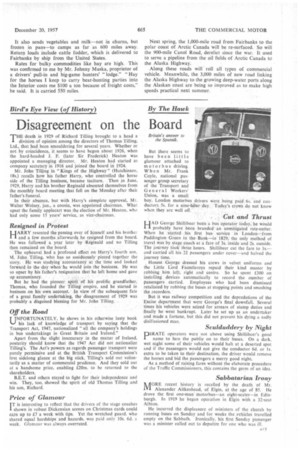Bird's Eye View (of History) By The Hawk
Page 49

If you've noticed an error in this article please click here to report it so we can fix it.
Disagreement on the Board
THE death in 1929 of Richard Tilling brought to a head a division of opinion among the directors of Thomas Tilling, Ltd., that had been smouldering for several years. Whether or not by coincidence, it seems to have begun about 1926, when the hard-headed J. F. (later Sir Frederick) Beaton was appointed a managing director. Mr. Heaton had started as company secretary in 1916 and joined the board in 1924. Mr. John Tilling in "Kings of the Highway" (Hutchinson. 18s.) recalls how his father Harry, who controlled the horse side of the Tilling business, became taciturn. Then in June, 1929, Harry and his brother Reginald absented themselves from the monthly board meeting that fell on the Monday after then father's funeral.
In their absence, but with Harry's complete approval, Mr. Walter Wolsey, jun., a cousin, was appointed chairman. What upset the family applecart was the election of Mr. Heaton, who had only some 15 years' service, as vice-chairman.
Resigned in Protest
HIARRY resented the passing over of himself and his brother and a few months afterwards he resigned from the board. He was followed a year later by Reginald and no Tilling then remained on the board.
The upheaval had a brofound effect on Harry's fourth son. M. John Tilling, who has so assidtiously pieced together the story. He was studying accountancy at the time and looked forward to the day 'when he would join the business. He was so upset by his father's resignation that he left -home 'and gave up -accountancy.
But he had the pioneer spirit of his prolific grandfather, Thomas, who founded the Tilling empire, and he started in business on his own account. In view of the subsequent fate of a great family undertaking, the disagreement of 1929 was probably a disguised blessing for Mr. John Tilling.
Off the Road
TNFORTUNATELY, he shows in his otherwise lusty book his lack of knowledge of transport by saying that the Transport Act, 1947, nationalized "all the company's holdings in bus undertakings in Great Britain and Ireland." Apart from the slight inaccuracy in the matter of Ireland. posterity should know that the 1947 Act did not nationalize Tilling's. The Act's powers as regards passenger transport were purely permissive and at the British Transport Commission's first sidelong glance at the big stick, Tilling's sold out voluntarily as a matter of commercial prudence. And they sold out at a handsome price, enabling £20m. to he returned to the shareholders.
B.E.T. and others stayed to fight for their independence and win. They, too, showed the spirit of old Thomas Tilling and his son, Richard.
Price of Glamour
IT is interesting to reflect that the drivers of the stage coaches shown in robust Dickensian scenes on Christmas cards could earn up to £7 a week with tips. Yet the wretched guard, who shared equal hardships and hazards, was paid only 10s. 6d. a week. Glamour was always overrated. But there seems to have been little glamour attached to motorbus driving When Mr. Frank Coyle, national passenger group secretary of the Transport and General Workers' Union, was a small boy, London motorbus drivers were being paid 6s. and conductott 5s, for a nine-hour day. Today's crews do not know when they arc well off. .
Cut and Thrust HAO George Shillibeer been. a bus operator today, he would probably have been branded an unmitigated rate-cutter. When he started his first bus. service in London—from Paddington Green to theBank----in 1129; the only method of travel was by stage coach at a fare of 3s. inside and 2s. outside. The journey took: three hours. Shillibeer cut the fare to ls.— and carried all his 22 passengers under cover—and halved the journey time.
, Honest George dressed his crews in velvet uniforms and the Little ford Fauntieroys repaid their kind master by robbing him left, right and centre. So he spent £300 on installing devices automatically to record the number of passengers carried. Employees who had been dismissed retaliated by robbing the buses at stopping points and smashing the recorders.
But it was railway competition and the depredations of the Excise department that were George's final downfall. Several times his vehicles were seized for arrears of stamp duties and finally he went bankrupt. Later he set up as an undertaker and made a fortune, but this did not prevent his dying a sadly disillusioned man.
Sculduddery by Night
PIRATE operators were not above using Shillibeer's good name to lure the public on to their buses. On a dark, wet night some of their vehicles would halt at a deserted spot and if the passengers would not give the conductor 6d. or Is. extra to be taken to their destination, the driver would remove the horses and bid the passengers a merry good night.
As a method of raising fares without the elaborate procedure of the Traffic Commissioners, this contains the germ of an idea.
Sabbatarian Irony
MORE recent history is recalled by the death of Mr. Alexander Aitkenhead, of Elgin, at the age of 85. He drove the first one-man motorbus—an eight-seater—in Edinburgh. In 1919 he began operation in Elgin with a 32-seat
He incurred the displeasure of ministers of the church by running buses on Sunday and for weeks the .vehicles travelled empty on the Sabbath. Ironically, his first Sunday passenger was a minister called out to deputize for one who was ill.




























































































